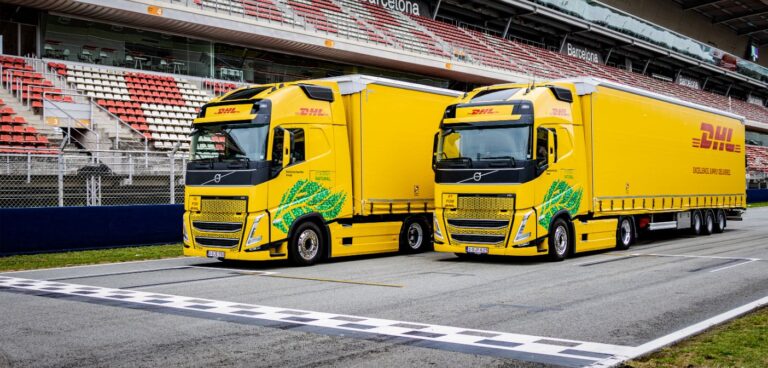DHL Express has deployed a fleet of 18 biofuel-powered trucks to assist with the logistics operations of all remaining European races in the current Formula 1 season.
The trucks are capable of running on hydrotreated vegetable oil (HVO). HVO100 drop-in fuel will be used instead of diesel, which DHL claims can reduce carbon emissions by a minimum of 60% for each vehicle.
HVO uses renewable feedstocks like waste vegetable oil and animal fats which, after going through a hydrotreating process, form a biofuel that can be used as an alternative to fossil fuels.
This deployment will assist Formula 1 in reaching its target of net zero carbon emissions ‘from factory to flag’ by 2030. This target was set in 2019 with the launch of Formula 1’s first-ever sustainability strategy.
Ellen Jones, Head of Environmental, Social, and Governance (ESG) at Formula 1, said: “We are a sport which operates on a global scale and DHL plays a critical role in delivering the races and helping us address the logistical impact we have as a World Championship.
“Together we are continually looking for more sustainable solutions, and through innovations such as the biofueled trucks we’re able to take the next step forward in reducing our carbon emissions and achieving our sustainability goal of being net zero by 2030.”
DHL assures that these new trucks ‘reduce carbon emissions while maintaining the same level of performance in terms of load capacity and travel distance as their diesel counterparts’.
Paul Fowler, Head of DHL Motorsports Logistics, explained: “Each truck can transport up to 40 tons and travel up to 3,500km per 1,000 litre tank. For the European F1 leg the trucks run entirely on HVO100, which is a second-generation biofuel, meeting the standard EN15940 for paraffin fuels, as well as a drop-in fuel.”
DHL has been the official logistics partner of the Formula 1 World Championship since 2004, with the partnership having been renewed in March 2021. Its other strategies to meet sustainability goals include route optimisation, monitoring fuel consumption, and using aircraft that produce fewer emissions.
Following the Monaco Grand Prix last weekend, there are 16 races remaining in the 2023 season, seven of which are taking place in Europe. The new trucks will be in use in the coming weeks for the European leg of the competition.







